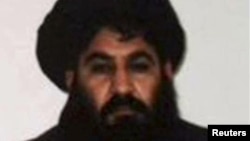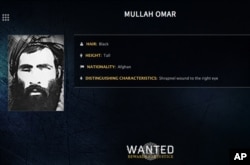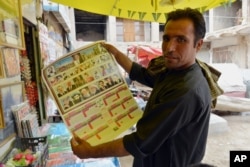The Taliban has released an audio message from new leader Mullah Akhtar Mansoor, intended to reassure Taliban leaders, elders, clerics and scholars that the Taliban jihad will continue until the Islamic system is brought to Afghanistan.
Mansoor said all decisions will be taken in the light of Islamic law, be it war or peace talks, and advised his followers not to pay attention to rumors being spread about the Taliban campaign.
He said the Taliban leadership will make all efforts to maintain internal unity at all cost.
"We should keep our unity, we must be united, our enemy will be happy in our separation," Mansoor purportedly said in the message. "This is a big responsibly on us. This is not the work of one, two or three people. This is all our responsibility to carry on jihad until we establish the Islamic state."
He said Mullah Mohammed Omar gave him all the responsibilities while he was still alive, so he is simply continuing with the mission as instructed by the late leader.
Mansoor's emphasis on maintaining unity in the Taliban ranks gives credence to reports that his appointment has caused rifts in the Islamic insurgent group.
Haqqani network
Earlier Saturday the Taliban denied reports of the death of Jalaluddin Haqqani, the founder of the Haqqani network.
Friday the Taliban announced that Haqqani's son, Sirajuddin Haqqani, had been appointed one of two deputies to Mullah Mansoor, the new leader of the militant group.
In a Pashto language statement sent to VOA and other media outlets Saturday, Taliban spokesman Zabihullah Mujahid said Jalaluddin Haqqani was sick but has now fully recovered.
The Taliban has named Mansoor to replace Taliban founder Omar, whose death was disclosed earlier this week.
The White House said U.S. intelligence can confirm Taliban leader Omar is dead, but did not say how long ago he died or under what circumstances.
An Afghan Taliban splinter faction called Fidai Mahaz, which first leaked the news of Omar's death few days ago, claimed Saturday that the Taliban's founder was in fact poisoned to death.
The Taliban has not yet commented on the claims.
'Genuine peace'
The United States is calling on the Taliban's new leaders to take part in what the U.S. sees as an extremely promising opportunity for "a genuine peace" and reconciliation between the Taliban and the Kabul government.
U.S. Special Representative for Afghanistan and Pakistan Daniel Feldman, the top American diplomat working on Afghan peace efforts, said the United States hopes all sides will move beyond the cancellation of Friday's scheduled peace talks following confirmation of Omar's death.
Saturday, Feldman met with Pakistan military chief General Raheel Sharif to praise "his role in bringing all parties to peace talks between Afghanistan Government and Taliban."
A Pakistan military statement quoted Ambassador Feldman as saying he "hoped with all sincerity that talks would resume soon to bring lasting peace."
Mansoor is seen as close to Pakistan, which is believed to have sheltered and supported the insurgents through the war. Whether he'll be keen to sit down for peace talks with the Afghan government remains in question.
Meanwhile, Taliban attacks against Afghan officials and forces have intensified with their annual warm-weather offensive.
Local security forces increasingly find themselves under attack as NATO and U.S. troops ended their combat mission in the country at the end of last year.
Luis Ramirez contributed to this report from the White House.






